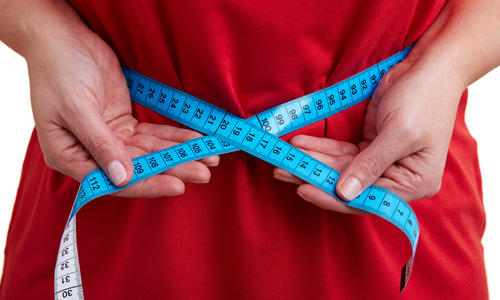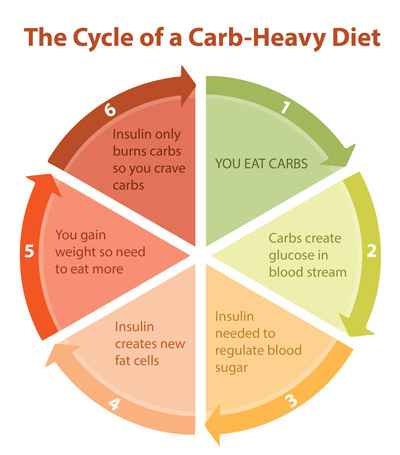There are many ways to lose a lot of weight fast.
However, most of them will make you hungry and unsatisfied.
If you don't have iron willpower, then hunger will cause you to give up on these plans quickly.
The plan outlined here will:
- Reduce your appetite significantly.
- Make you lose weight quickly, without hunger.
- Improve your metabolic health at the same time.
Here is a simple 3-step plan to lose weight fast.
The most important part is to cut back on sugars and starches (carbs).
When you do that, your hunger levels go down and you end up eating much fewer calories (1).
Now instead of burning carbs for energy, your body starts feeding off of stored fat.
Another benefit of cutting carbs is that it lowers insulin levels, causing your kidneys to shed excess sodium and water out of your body. This reduces bloat and unnecessary water weight (2, 3).
It is not uncommon to lose up to 10 pounds (sometimes more) in the first week of eating this way, both body fat and water weight.
This is a graph from a study comparing low-carb and low-fat diets in overweight or obese women (4).

The low-carb group is eating until fullness, while the low-fat group is calorie-restricted and hungry.
Cut the carbs and you will start to eat fewer calories automatically and without hunger (5).
Put simply, cutting carbs puts fat loss on autopilot.
SUMMARYRemoving sugars and starches (carbs) from your diet will reduce your appetite, lower your insulin levels and make you lose weight without hunger.
Each one of your meals should include a protein source, a fat source and low-carb vegetables.
Constructing your meals in this way will automatically bring your carb intake into the recommended range of 20–50 grams per day.
Protein Sources
- Meat: Beef, chicken, pork, lamb, etc.
- Fish and Seafood: Salmon, trout, shrimp, etc.
- Eggs: Whole eggs with the yolk are best.
The importance of eating plenty of protein cannot be overstated.
High-protein diets can also reduce cravings and obsessive thoughts about food by 60%, reduce the desire for late-night snacking by half, and make you so full that you automatically eat 441 fewer calories per day — just by adding protein to your diet (9, 10).
When it comes to losing weight, protein is the king of nutrients. Period.
Low-Carb Vegetables
- Broccoli
- Cauliflower
- Spinach
- Tomatoes
- Kale
- Brussels sprouts
- Cabbage
- Swiss chard
- Lettuce
- Cucumber
- Full list here.
Don’t be afraid to load your plate with these low-carb vegetables. You can eat massive amounts of them without going over 20–50 net carbs per day.
A diet based mostly on meat and vegetables contains all the fiber, vitamins and minerals you need to be healthy.
Fat Sources
- Olive oil
- Coconut oil
- Avocado oil
- Butter
Eat 2–3 meals per day. If you find yourself hungry in the afternoon, add a 4th meal.
Don’t be afraid of eating fat, as trying to do both low-carb AND low-fat at the same time is a recipe for failure. It will make you feel miserable and abandon the plan.
To see how you can assemble your meals, check out this low-carb meal plan and this list of 101 healthy low-carb recipes.
SUMMARYAssemble each meal out of a protein source, a fat source and low-carb vegetables. This will put you in the 20–50 gram carb range and significantly lower your hunger levels.
You don't need to exercise to lose weight on this plan, but it is recommended.
The best option is to go to the gym 3–4 times a week. Do a warm-up and lift some weights.
If you're new to the gym, ask a trainer for some advice.
By lifting weights, you will burn lots of calories and prevent your metabolism from slowing down, which is a common side effect of losing weight (11, 12).
Studies on low-carb diets show that you can even gain a bit of muscle while losing significant amounts of body fat (13).
If lifting weights is not an option for you, then doing some cardio workouts like walking, jogging, running, cycling or swimming will suffice.
SUMMARYIt is best to do some sort of resistance training like weight lifting. If that is not an option, cardio workouts are also effective.
You can take one day off per week where you eat more carbs. Many people prefer Saturday.
It is important to stick to healthy carb sources like oats, rice, quinoa, potatoes, sweet potatoes, fruit, etc.
But only this one higher carb day — if you start doing it more often than once per week you're not going to see much success on this plan.
If you must have a cheat meal and eat something unhealthy, then do it on this day.
Be aware that cheat meals or carb refeeds are NOT necessary, but they can boost some fat-burning hormones like leptin and thyroid hormones (14, 15).
You will gain some weight during your refeed day, but most of it will be water weight and you will lose it again in the next 1–2 days.
SUMMARYHaving one day each week where you eat more carbs is perfectly acceptable, although not necessary.
It is NOT necessary to count calories as long as you keep the carbs very low and stick to protein, fat and low-carb vegetables.
However, if you really want to count them, use this calculator.
Enter your details, and then pick the number from either the "Lose Weight" or the "Lose Weight Fast" section — depending on how fast you want to lose weight.
There are many great tools you can use to track the number of calories you are eating. Here is a list of 5 calorie counters that are free and easy to use.
The main goal of this plan is to keep carbs under 20–50 grams per day and get the rest of your calories from protein and fat.
SUMMARYIt is not necessary to count calories to lose weight on this plan. It is most important to strictly keep your carbs in the 20–50 gram range.
Here are 10 more tips to lose weight even faster:
- Eat a high-protein breakfast. Eating a high-protein breakfast has been shown to reduce cravings and calorie intake throughout the day (16, 17).
- Avoid sugary drinks and fruit juice. These are the most fattening things you can put into your body, and avoiding them can help you lose weight (18, 19).
- Drink water a half hour before meals. One study showed that drinking water a half hour before meals increased weight loss by 44% over 3 months (20).
- Choose weight loss-friendly foods (see list). Certain foods are very useful for losing fat. Here is a list of the 20 most weight loss-friendly foods on earth.
- Eat soluble fiber. Studies show that soluble fibers may reduce fat, especially in the belly area. Fiber supplements like glucomannan can also help (21, 22).
- Drink coffee or tea. If you're a coffee or tea drinker, then drink as much as you want as the caffeine can in them boost your metabolism by 3–11% (23, 24, 25).
- Eat mostly whole, unprocessed foods. Base most of your diet on whole foods. They are healthier, more filling and much less likely to cause overeating.
- Eat your food slowly. Fast eaters gain more weight over time. Eating slowly makes you feel more full and boosts weight-reducing hormones (26, 27).
- Weigh yourself every day. Studies show that people who weigh themselves every day are much more likely to lose weight and keep it off for a long time (28, 29).
- Get a good night's sleep, every night. Poor sleep is one of the strongest risk factors for weight gain, so taking care of your sleep is important (30).
Even more tips here: 30 Easy Ways to Lose Weight Naturally (Backed by Science).
SUMMARYIt is most important to stick to the three rules, but there are a few other things you can do to speed things up.

You can expect to lose 5–10 pounds of weight (sometimes more) in the first week, then consistent weight loss after that.
I can personally lose 3–4 pounds per week for a few weeks when I do this strictly.
If you're new to dieting, then things will probably happen quickly. The more weight you have to lose, the faster you will lose it.
For the first few days, you might feel a bit strange. Your body has been burning carbs for all these years, so it can take time for it to get used to burning fat instead.
This is called the "low-carb flu" or “keto flu” and is usually over within a few days. For me it takes three. Adding some extra salt to your diet can help with this.
After the first few days, most people report feeling very good, with even more energy than before.
Despite many decades of anti-fat hysteria, the low-carb diet also improves your health in many other ways:
- Blood sugar tends to go way down on low-carb diets (31).
- Triglycerides tend to go down (32).
- Small, dense LDL (the bad) cholesterol goes down (33, 34).
- HDL (the good) cholesterol goes up (35).
- Blood pressure improves significantly (36, 37).
- To top it all off, low-carb diets appear to be just as easy to follow as low-fat diets.
SUMMARYYou can expect to lose a lot of weight, but it depends on the person how quickly it will happen. Low-carb diets also improve your health in many other ways.
If you have a medical condition, talk to your doctor before making changes because this plan can reduce your need for medication.
By reducing carbs and lowering insulin levels, you change the hormonal environment and make your body and brain "want" to lose weight.
This leads to drastically reduced appetite and hunger, eliminating the main reason that most people fail with conventional weight loss methods.
This is proven to make you lose up to 2–3 times as much weight as a typical low-fat, calorie-restricted diet (38, 39, 40).
Another great benefit for the impatient folks is that the initial drop in water weight can lead to a big difference on the scale as early as the next morning.
Here are a few examples of low-carb meals that are simple, delicious and can be prepared in under 10 minutes: 7 Healthy Low-Carb Meals in 10 Minutes or Less.
On this plan, you can eat good food until you’re full and still lose a ton of fat. Welcome to paradise.


